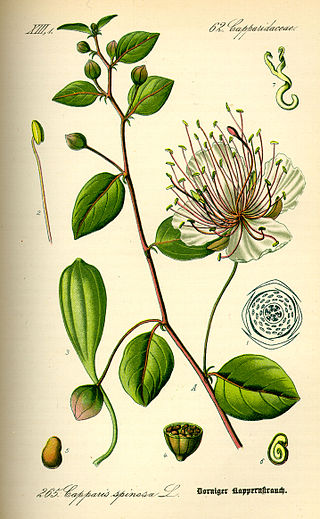
Capparis spinosa, the caper bush, also called Flinders rose, is a perennial plant that bears rounded, fleshy leaves and large white to pinkish-white flowers.

Prunus spinosa, called blackthorn or sloe, is a species of flowering plant in the rose family Rosaceae. The species is native to Europe, western Asia, and regionally in northwest Africa. It is locally naturalized in New Zealand, Tasmania, and the Pacific Northwest and New England regions of the United States.

Jubilation is the tenth and final studio album by Canadian/American rock group the Band. Recorded in the spring of 1998 in Levon Helm's home studio in Woodstock, New York, it was released on September 15, 1998. For the first time since the group reformed without guitarist and songwriter Robbie Robertson, there were more originals than covers. Songs include "Last Train to Memphis", featuring guest guitarist Eric Clapton, Garth Hudson's solo instrumental closer "French Girls", Rick Danko's "High Cotton" and the ode to Ronnie Hawkins, "White Cadillac".

Bursaria spinosa is a small tree or shrub in the family Pittosporaceae. The species occurs mainly in the eastern and southern half of Australia and not in Western Australia and the Northern Territory. Reaching 10 m (35 ft) high, it bears fragrant white flowers at any time of year but particularly in summer. A common understorey shrub of eucalyptus woodland, it colonises disturbed areas and fallow farmland. It is an important food plant for several species of butterflies and moths, particularly those of the genus Paralucia, and native bees.

Hydrolea is the only genus of the family Hydroleaceae of the order Solanales.

Esthlogena is a genus of longhorn beetles of the subfamily Lamiinae.
Esthlogena amaliae is a species of beetle in the family Cerambycidae. It was described by Galileo and Martins in 2011.
Esthlogena dissimilis is a species of beetle in the family Cerambycidae. It was described by Galileo and Martins in 2011.
Esthlogena nigrosuturalis is a species of beetle in the family Cerambycidae. It was described by Galileo and Martins in 2011.
Esthlogena brunnescens is a species of beetle in the family Cerambycidae. It was described by Stephan von Breuning in 1940. It is known from Colombia.
Esthlogena lanata is a species of beetle in the family Cerambycidae. It was described by Stephan von Breuning in 1940. It is known from Brazil.
Esthlogena obliquata is a species of beetle in the family Cerambycidae. It was described by Stephan von Breuning in 1940. It is known from Brazil.
Esthlogena albisetosa is a species of beetle in the family Cerambycidae. It was described by Henry Walter Bates in 1880. It is known from Honduras and Mexico.
Esthlogena guatemalena is a species of beetle in the family Cerambycidae. It was described by Henry Walter Bates in 1885. It is known from Guatemala.
Esthlogena mirandilla is a species of beetle in the family Cerambycidae. It was described by Henry Walter Bates in 1885. It is known from Panama and Guatemala.

Esthlogena porosa is a species of beetle in the family Cerambycidae. It was described by Henry Walter Bates in 1872. It is known from Mexico, Honduras, Costa Rica, Panama, and Nicaragua.
Esthlogena glaucipennis is a species of beetle in the family Cerambycidae. It was described by James Thomson in 1868. It is known from Brazil.
Esthlogena porosoides is a species of beetle in the family Cerambycidae. It was described by Stephan von Breuning in 1969. It is known from Brazil.
Esthlogena spinipennis is a species of beetle in the family Cerambycidae. It was described by Stephan von Breuning in 1942. It is known from Brazil.
Esthlogena foveolata is a species of beetle in the family Cerambycidae. It was described by Per Olof Christopher Aurivillius in 1920 and is known from Bolivia.





